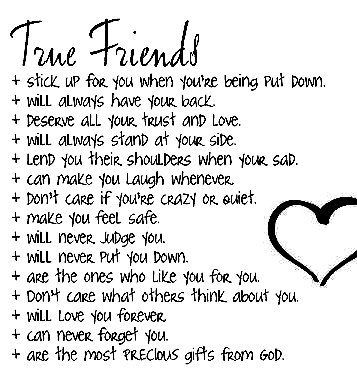To start this post off, I have to honestly say that I don't have too many true friends that are actually understanding and know me well. This is partially because I don't bother to become friends with certain people, but the main reasons to this are because I don't fit in with some people, and that others aren't understanding and don't want to know much about me to become friends. Now to compare true friends and fake ones from my experience.
What a true friend is to me
A true friend is someone that is understanding, caring, and wants to know more about you. They will get to know you before you have a chance to get to know them, and they will rarely assume things about you, compared to fake friends. And they will definitely want to know all about you, meaning that they will constantly get to know you. This requires an open mind, as a true friend needs to be open to ideas about you. A true friend is definitely somebody that you talk a lot to, whether it's about serious topics or random silly topics that nobody else knows about. They are also accepting, meaning that they won't shun you just because they don't like one aspect about you. True friends are also great listeners, meaning that they will always listen to you and your stories and try to help you out if there are any problems. You can trust on a true friend, since they have a good reputation with you. A true friend is caring and will give advice to you, whenever you may seem to need it. But most importantly, true friends will usually be there for you when you are in need of help, or if you are struggling with something. I don't have too many true friends now because after elementary school, there aren't a lot understanding people, or people who don't make assumptions about you, leading to rumors, leading to what a fake friend is.
What a fake friend is to me
A fake friend is somebody that is not understanding about you. They won't understand a lot about you, which constantly leads to inaccurate assumptions that ruin the friendship. They aren't caring either, as they will use "i don't care, or "who cares?" a lot around you. A fake friend is also someone who doesn't know you very well, and doesn't want to know you a lot anyways. This could be because they do not have a very open mind towards you, meaning that you have to practically show every single aspect of yourself to fake friends for them to know you better, otherwise this will lead to assumptions about you once again. You won't talk a lot with somebody that isn't a true friend, and they won't even talk to you a lot either. Fake friends aren't really accepting, so they will start to shun you if they don't like something about you. They also aren't very good at listening and they will ignore you if what you're telling them seems boring to them. A fake friend is not very trustworthy, as they haven't shown it to you during your entire friendship with the person. Don't expect a fake friend to care much about you or give advice, since they won't know you enough to do so. But the worst thing about fake friends is that they usually will not be there for you when you're struggling or you need help. Right now, quite a few of my friends are just fake friends, since they aren't very open to who I am, even after I show who I am to them.
There's a short video that I found that I think tells the difference between true and fake friends quite well:
Also, I've noticed that the amount of true friends that I had in elementary and middle school were really different. Back then in elementary school, when there were more caring people who wouldn't judge me right away, I had more true friends since the people I knew at that time were a lot more open. But now, it is a bit hard for me to acquire true friends, since now people do not care as much about each other and they tend to judge one another much more quickly. Right now I still have some true friends I can rely on, but not as much as I used to back then. All of this has to do with open-mindedness, as you can see so for yourself in my third blog post.
I also found a link to a website that explains the difference between true and fake friends very well. The grammar here may be a bit of a problem, but you should understand what the person is talking about:
http://dreamer32.hubpages.com/hub/Fake-friends-or-True-friend-knowing-the-difference
I won't be having the "my opinion" section for this post as the previous two paragraphs differentiating what a true and fake friend is already includes enough of my opinion.
Well, that's all the posts I'll be doing for today! Expect some posts out in the next few days. :)
~Vincent




.jpg)





